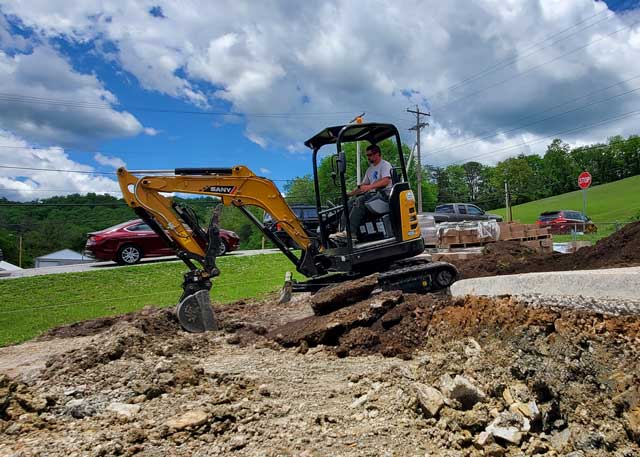Expert Septic Ohio - Trusted Septic System Experts in Ohio
Expert Septic Ohio - Trusted Septic System Experts in Ohio
Blog Article
Comprehensive Excavation Strategies: Grasping the Fundamentals for Success
In the realm of construction and civil engineering, the value of effective excavation methods can not be overemphasized. The careful planning, exact implementation, and precise interest to information called for in excavation projects demand a thorough approach that encompasses different essential facets. From preliminary dirt evaluation to the execution of precaution and normal progression tracking, understanding these core components is crucial for accomplishing success in any type of excavation undertaking. Nonetheless, truth proficiency exists not just in comprehending these basics however in flawlessly incorporating them to browse the complexities of excavation projects with finesse.
Comprehending Excavation Job Preparation

Successful excavation projects are built on the structure of complete and thorough preparation. The preliminary stage of any type of excavation task is the planning phase, where essential choices are made that can considerably influence the outcome of the task. During this stage, it is important to gather all pertinent information regarding the site, including topographical studies, soil make-up, and any kind of potential threats that may exist. Recognizing the project scope, budget plan, and timeline restrictions is important for creating a detailed excavation strategy that guarantees the task's success.
One trick facet of excavation task preparation is the development of an in-depth timeline that outlines the series of target dates, tasks, and turning points. By carefully taking into consideration all these aspects during the preparation stage, excavation jobs can be executed efficiently and efficiently, leading to successful results - septic ohio.
Soil Analysis and Website Evaluation
Carrying out thorough soil analysis and website evaluation is an important action in the preparation phase of any kind of excavation project. Soil evaluation entails identifying the structure, framework, and residential properties of the dirt at the excavation site. This info is critical for understanding the soil's bearing ability, moisture content, and possibility for erosion, which are essential variables in identifying the excavation approaches and tools needed for the project.
Site evaluation goes beyond dirt analysis and incorporates a more comprehensive assessment of the general site problems. This evaluation consists of recognizing any type of prospective threats, such as below ground energies, environmental worries, or unstable terrain, that might impact the excavation procedure. By thoroughly assessing the website, task managers can establish reliable excavation strategies that focus on security, performance, and environmental management.
Making use of innovative modern technologies like ground-penetrating radar, dirt sampling, and drone surveys can boost the precision and effectiveness of soil evaluation and site assessment. Spending time and sources in these initial steps can inevitably conserve time and stop expensive delays or problems during the excavation process.
Equipment Selection and Application
Reliable excavation tasks depend heavily on calculated equipment option and usage to make certain optimal efficiency and productivity. Picking the best devices for the job is vital in making the most of efficiency and lessening downtime. Factors such as the sort of soil, deepness of excavation, and project extent play a considerable role in determining one of the most suitable tools for the task available.

Along with picking the ideal tools, correct application is vital to project success. Operators must be trained to handle the equipment securely and efficiently - lancaster trenching. Normal upkeep checks and prompt repairs help prevent break downs and make sure regular efficiency throughout you could check here the project
Security Actions and Laws Compliance
In the realm of excavation projects, focusing on precaution and compliance with policies is critical to guaranteeing a protected and legally audio operational environment. Precaution incorporate a range of practices, including performing complete site evaluations, applying correct signs and barriers, and offering ample safety Related Site and security training for all workers associated with the excavation process. Adherence to policies, such as OSHA requirements in the USA, ensures that the excavation task satisfies the necessary standards to shield employees, spectators, and the surrounding atmosphere.

Monitoring Development and Adjusting Methods
Just how can project supervisors effectively track the advancement of excavation tasks and adapt their techniques appropriately to optimize end results? Monitoring development is vital for ensuring that excavation projects remain on track and fulfill target dates. Job managers can utilize numerous tools and techniques to track progression, such as day-to-day report card, routine website inspections, and progressed surveillance modern technologies like drones and general practitioners tracking systems. By continuously monitoring the job's innovation, supervisors can determine any possible delays or problems early on and take positive measures to resolve them.

Final Thought
In final thought, mastering the principles of detailed excavation techniques is important for the success of any kind of job. By understanding task preparation, analyzing dirt and site problems, choosing appropriate tools, abiding by security regulations, and keeping track of progress, project supervisors can guarantee a efficient and smooth excavation process. Implementing these strategies will bring about effective results and decrease prospective risks or setbacks during the excavation project.
The first phase of any excavation job is the preparation stage, where crucial choices are made that can dramatically impact the end result of the project. Comprehending the task timeline, budget plan, and scope restrictions is crucial for producing a thorough excavation strategy that ensures the job's success.
Exactly how can predict supervisors informative post effectively track the innovation of excavation tasks and adapt their techniques appropriately to maximize end results? By closely keeping track of development and being eager to adjust strategies, project managers can enhance the general success of excavation jobs.
By recognizing task planning, examining soil and website problems, picking ideal tools, abiding with security guidelines, and keeping an eye on progression, task supervisors can make sure a effective and smooth excavation process.
Report this page